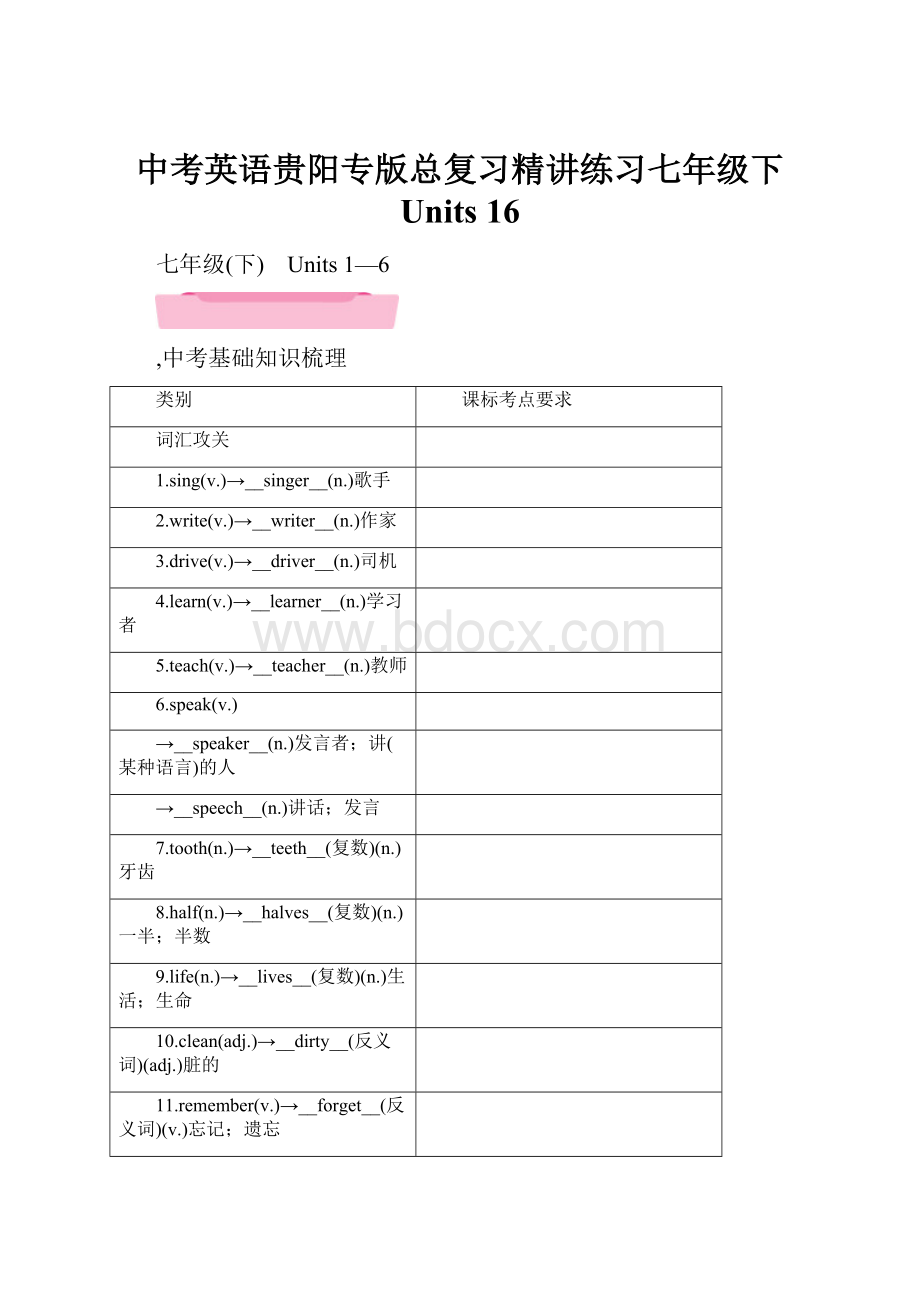 中考英语贵阳专版总复习精讲练习七年级下 Units 16.docx
中考英语贵阳专版总复习精讲练习七年级下 Units 16.docx
- 文档编号:11597109
- 上传时间:2023-03-20
- 格式:DOCX
- 页数:21
- 大小:65.80KB
中考英语贵阳专版总复习精讲练习七年级下 Units 16.docx
《中考英语贵阳专版总复习精讲练习七年级下 Units 16.docx》由会员分享,可在线阅读,更多相关《中考英语贵阳专版总复习精讲练习七年级下 Units 16.docx(21页珍藏版)》请在冰豆网上搜索。

中考英语贵阳专版总复习精讲练习七年级下Units16
七年级(下) Units1—6
中考基础知识梳理
类别
课标考点要求
词汇攻关
1.sing(v.)→__singer__(n.)歌手
2.write(v.)→__writer__(n.)作家
3.drive(v.)→__driver__(n.)司机
4.learn(v.)→__learner__(n.)学习者
5.teach(v.)→__teacher__(n.)教师
6.speak(v.)
→__speaker__(n.)发言者;讲(某种语言)的人
→__speech__(n.)讲话;发言
7.tooth(n.)→__teeth__(复数)(n.)牙齿
8.half(n.)→__halves__(复数)(n.)一半;半数
9.life(n.)→__lives__(复数)(n.)生活;生命
10.clean(adj.)→__dirty__(反义词)(adj.)脏的
11.remember(v.)→__forget__(反义词)(v.)忘记;遗忘
12.true(adj.)→__truth__(n.)真相
→__truly__(adv.)真正地
13.friend(n.)→__friendly__(adj.)友好的
14.noisy(adj.)→__quiet__(反义词)(adj.)安静的
→__noise__(n.)噪音
15.luck(n.)→__lucky__(adj.)幸运的
→(adj.的反义词)__unlucky__(adj.)不幸的
→__luckily__(adv.)幸运地;好运地
16.feel(v.)→__feeling__(n.)感觉
17.early(adj.)→__late__(反义词)(adj.)迟到
→__quick__(adj.)快的
→(adj.的反义词)__slow__(adj.)缓慢的;迟缓的
18.quickly(adv.)→__slowly__(反义词)(adv.)慢慢地
19.old(adj.)→(反义词)__new__(adj.)新的;刚出现的
→(反义词)__young__(adj.)幼小的;年轻的
20.rule(n.)→__ruler__(n.)尺子;统治者
21.usually(adv.)→__usual__(adj.)寻常的
→(adj.的反义词)__unusual__(adj.)不寻常的
22.important(adj.)→__importance__(n.)重要性
23.beautiful(adj.)→(反义词)__ugly__(adj.)丑陋的
→__beauty__(n.)美丽
→__beautifully__(adv.)漂亮地
24.Australia(n.)
→__Australian__(adj.&n.)澳大利亚的;澳大利亚人
25.south(n.)→__southern__(adj.)南方的
→(合成词)__southeast__(n.)东南
26.Africa(n.)→__African__(adj.&n.)非洲的;非洲人
27.sleep(v.&n.)→__sleepy__(adj.)困倦的
→__asleep__(adj.)睡着的
→(adj.的反义词)__awake____(adj.)醒着的
28.danger(n.)→__safety__(反义词)(n.)安全;安全性
→__dangerous__(adj.)危险的
→(adj.的反义词)__safe__(adj.)安全的
短语归纳
1.下国际象棋__play__chess__
2.说英语__speak__English__
3.擅长于……__be__good__at…__
善于应付……的;对……有办法__be__good__with…__
对……有好处__be__good__for…__
4.跟……说__talk__to/with…__
5.弹钢琴__play__the__piano__
敲鼓__play__the__drums__
拉小提琴__play__the__violin__
6.结交朋友__make__friends__
7.在某方面帮助(某人)__help__(sb.)with__sth.__
8.(在)周末__on__the__weekend/on__weekends__
9.起床;站起__get__up__
10.穿上衣服__get__dressed__
11.洗淋浴__take__a__shower__
12.广播电台__radio__station__
13.做作业__do__(one's)__homework__
14.散步;走一走__take__a__walk__
15.要么……要么……;或者……或者……__either…or…__
16.大量;许多__lots__of__
17.到达__get__to__
18.乘地铁__by__subway/take__the__subway__
19.骑自行车__ride__a__bike/by__bike__
20.实现;成为现实__come__true__
21.认为__think__of__
22.在……和……之间__between…and…__
23.清洗餐具__do__the__dishes__
24.(对某人)要求严格__be__strict__(with__sb.)__
25.遵守规则__follow__the__rules__
26.处于(极大)危险之中__be__in__(great)__danger__
27.看报纸__read__a__newspaper__
28.看电影__go__to__the__movies__
续表
类别
课标考点要求
句型再现
1.“你想加入什么俱乐部?
”
“我想加入一个体育俱乐部。
”
—__What__club__doyouwanttojoin?
—I__want__to__join__a__sports__club__.
2.那么我们需要你帮助说英语的学生开展体育活动。
Thenweneedyou__to__help__with__sportsforEnglish speakingstudents.
3.“你通常几点钟起床?
”“我通常在6点半起床。
”
—__What__time__do__youusuallygetup?
—Iusuallygetup__at__six__thirty/half__past__six__.
4.晚上我或者看电视或者玩电脑游戏。
Intheevening,I__either__watchTV__or__playcomputergames.
5.在10点半,我刷牙,然后上床睡觉。
__At__ten__thirty__,I__brush__my__teeth__andthenI__go__to__bed__.
6.“你家离学校有多远?
”
“我不太肯定……大约10公里?
”
—__How__far__is__it__fromyourhometoschool?
—__I'm__not__sure__…about10kilometers?
7.“你到学校要用多长时间?
”“骑自行车大约15分钟。
”
—Howlong__does__it__take__you__to__get__to__school__?
—About15minutesbybike.
8.对许多学生来说,到校很容易。
__For__many__students__,__it__is__easy__to__gettoschool.
9.我们必须拯救树木,不买象牙制品。
Wemust__save__the__trees__andnotbuy__things__made__of__ivory__.
10.他爸爸和叔叔正在看电视上的龙舟比赛。
Hisdadanduncle__are__watching__the__boat__races__on__TV.
11.朱辉很喜欢纽约和他的寄宿家庭,但“千好万好不如自己的家好”。
ZhuHuilikesNewYorkand__his__host__family__alot,butthere'sstill“__no__place__like__home__”.
12.“你在忙什么呢?
”“没忙什么。
”
—__What__are__you__doing__?
—Notmuch.
13.你想跟我一起吃饭吗?
Doyouwantto__join__me__for__dinner?
语法结构
话题
1.情态动词的用法
。
1.加入社团、俱乐部(Joiningaclub)(Unit1)
2.祈使句的用法。
2.日常活动(Dailyroutines)(Unit2)
3.现在进行时的用法。
3.交通工具(Transportation)(Unit3)
4.规章制度(Rules)(Unit4)
5.动物园的动物(Animalsinazoo)(Unit5)
6.日常活动(Everydayactivities)(Unit6)
贵阳中考重难点突破
辨析join,joinin,takepartin与attend
【满分点拨】
词语
辨析
例句
join
意为“加入某一组织;成为其中的一员”,其后还可以接表示人的名词或代词,表示加入到某人或某些人的行列中去
HisfatherjoinedthePartyin1956.他的爸爸1956年加入共产党。
joinin
常用于joininsth./doingsth.中,意为“参加”,后面接的宾语一般是表示竞赛、娱乐、游戏等活动的名词或动名词,此时用法与takepartin可以互换
Theyalljoininsingingthesong.他们一起唱这首歌。
CanIjoininthegame?
我可以参加这个游戏吗?
takepartin
指参加群众性活动、会议、劳动等,往往参加者持有积极的态度,起一些作用
WillyoutakepartintheEnglishEvening?
你将参加英语之夜吗?
attend
指“出席(会议);到场;上(课)”等
Whoattendedthemeeting?
谁出席了会议?
【考点抢测】
join,joinin,takepartin,attend
1.Whendidyourbrother__join__thearmy?
2.He'll__attend__animportantmeetingtomorrow.
3.Comealong,and__join__in__theballgame.
4.We'll__take__part__in__socialpracticeduringthesummervacation.
5.She__joined__theYoungPioneerslastyear.
辨析begoodat,begoodwith与begoodfor
【满分点拨】
短语
含义及用法
begoodat
“擅长”,相当于dowellin。
at后接名词、代词或v.ing形式
begoodwith
“善于应付……的;对……有办法”,with后接人。
其同义短语为getonwellwith
begoodfor
“对……有好处”,for后接名词。
其反义短语为bebadfor,意为“对……有害;对……有坏处”
【考点抢测】
begoodat,begoodfor,begoodwith
6.I__am__good__at__playingthepiano.
7.She__is__good__with__thechildren.
8.It__is__good__for__youreyestoeatmorecarrots.
辨析dress,puton,wear与bein
【满分点拨】
词汇
用法
dress给……穿衣
表示动作或状态,宾语通常是人,dresssb.“给某人穿衣服”(动作);dressoneself给自己穿衣服;be/getdressedin…“穿着……”(状态)
puton
穿上;戴上
强调动作,宾语通常是衣服、鞋帽;宾语若是代词必须放在put和on之间;反义词组是takeoff
wear
穿着;戴着
强调状态,宾语可为服装、鞋帽、饰物、奖章、眼镜等
bein
穿着
后接衣服、帽子等,此时可以和wear或havesth.on互换。
其后多接颜色,不能用于进行时态
【考点抢测】
(B)9.Look!
Mylittlebrotheris________himselfnow.
A.wearing B.dressing
C.puttingon
dress,puton,wear,bein
10.Theyoungmanalways__wears__aT shirt.
11.It'stoocoldoutside.__Put__on__yourcoat.
12.MyEnglishteacher__is__in__redtoday.
13.Theactressis__dressed__inthelatestfashion.
辨析also,aswell,too,either与neither
【满分点拨】
(1)辨析also,aswell,too与either
这四个词均含“也”之意,但具体用法不同:
词汇
用法
also
用于肯定句
较正式,放在实义动词之前,
系动词、助动词、情态动词之后
aswell
用于肯定句
常放在句末
too
用于肯定句
较口语,位于句末,
可用逗号隔开
either
用于否定句
放在句末,之前可加逗号
如:
Myfatherisateacher.Mymotherisalsoateacher.
=Myfatherisateacher.Mymotherisateacheraswell.
=Myfatherisateacher.Mymotherisateacher,too.我爸爸是一名老师,我妈妈也是。
Ican'tspeakFrench.Jennycan'tspeakFrench,either.我不会说法语,詹妮也不会。
(2)either用作副词,在否定句作“也”解释,通常置于句末。
如:
Lilydoesn'tlikefruit.Idon'tlikefruit,either.莉莉不喜欢水果,我也不喜欢。
either用作代词,“(两者之中)任一;任何一个”。
作主语时谓语动词用单数。
如:
Either(ofthebooks)ispopularwiththestudents.(两本书)随便哪一本都受到同学们的欢迎。
(主语)
either…or…,意为“不是……就是……;要么……要么……”,在句中连接两个并列成分。
在连接两个并列主语时,谓语动词必须在人称和数上与靠近的主语保持一致,即“就近一致”原则。
如:
EitheryouorTomhasdoneit.(连接并列主语)不是你就是汤姆做了这件事。
(3)neither“(两者)都不”,用作代词,表示“两者都不;双方均不”。
作主语时谓语动词用单数。
如:
Neitheroftheknivesisuseful.两把刀都没有用。
【考点抢测】
14.EithermyparentsorLucy__is__coming__(come).
15.Jackdoesn'tgototheparty.Lucydoesn'tgototheparty,__either__.
16.IinvitedTomandAnntodinner,but__neither__ofthemcame.
17.—WouldyoulikebeerorCoca Cola?
—Idon'tmind.__Either__isOK.
18.Marygoestoschoolonfoot.Iwalktoschool,__too__.
19.Youcan__also__putthephotosonthewall.
辨析take,by,in与on
【满分点拨】
take动词,后面+冠词+交通工具。
如:
takeataxi,takeacar,takeabus,takeatrain,takeaship等。
步行用walk。
骑自行车用rideabike。
by介词,指通过某种手段或某种方式,常和交通工具的单数形式直接连用。
如:
bybus,byboat,byplane等。
此时,既不能在名词前加限定词,也不能把名词改为复数形式。
如:
Mybrothergoestoschoolbybike.我哥哥骑自行车去上学。
当交通工具前有限定词(冠词和物主代词等)时,介词可用“on”,也可用“in”,in接小型的交通工具。
如:
inacar,inhiscar等。
on接大型交通工具,骑自行车除外。
如:
onabus,onhisbike等。
【注意】on还有一种特殊情况,表示“步行”除了可以用动词walk之外,还可以用介词短语onfoot。
介词by,in和on都可以与有关交通工具的名词搭配,表示交通方式。
如:
Heusuallygoestoworkbybus.他通常乘公共汽车去上班。
【考点抢测】
20.Iusedtogotoschool__by__bus__(乘公共汽车),buttodayIgotoschool__on__foot__(步行).
21.Theteachertoldusthatwewould__take__the__subway__(乘地铁)tovisitthemuseumnextSunday.
22.IoftengotoShanghai__by__train/on__a__train__(坐火车).
辨析between与among
【满分点拨】
between用于“两者之间”,只要可以构成双方关系,都可以用between。
短语为between…and…。
如:
Iwillcomebetweentwelveandoneo'clock.我将在十二点至一点之间过来。
among“在……之间”,强调是在三个或三个以上的人或事物之中。
如:
Therewassomeoneshoutingtomeamongthestudents.学生中间有人在喊我。
【注意】指三者或三者以上的人或事物中的每两者之间时,仍用between,不能用among。
如:
Thevillageliesbetweenthreehills.村子坐落在三座小山之间。
【考点抢测】
23.Thehighspeedrailway__between__GuiyangandChangshaopenedtotrafficinMay2015.
(C)24.Hisgradeintheexamputhim________thetopstudentsinhisclass.
A.between B.over C.among
辨析reach,getto与arrive
【满分点拨】
这一组词均表示“到达”之意。
reach是及物动词,后面必须接表地点的名词做宾语;get必须和to一起表示“到达”之意;arrive是不及物动词,其后若接大地点时,如国家、大城市等常用介词in,若接小地点时,如镇、家、店等,则用介词at。
若是用副词表达地点,getto和arrivein/at后面的介词均省去。
【图解助记】
【考点抢测】
arrive,get,reach
25.Whendidyou__arrive__atthevillage?
26.WhendidJim__reach__thebusstation?
27.Iusually__get__homeatabout5o'clockintheafternoon.
(C)28.MymotherandIloveShanghaiverymuch.We____ShanghaiforholidayslastSunday.
A.reachedtoB.got
C.gotto
辨析toomany,toomuch与muchtoo
【满分点拨】
短语
意义
用法
toomany
太多
其后接可数名词复数形式
toomuch
太多
其后接不可数名词,还可用作副词,修饰动词
muchtoo
太
much用来增强语气,后面常接形容词或副词
如:
Therearetoomanyflowersinthegarden.花园里的花太多了。
Ihavetoomuchhomeworkthisevening.今天晚上我的家庭作业太多了。
Thisboxismuchtooheavy.这个箱子太重了。
【考点抢测】
toomany,toomuch,muchtoo
29.Youshouldn'teat__too__much__meatbecauseit'sbadforyourhealth.
30.Today,__too__many__treesarestillbeingcutdownsomewhereintheworld.
31.Thesweaterisverybeautiful,butit's__much__too__dear.
(B)32.Look!
There's________iceonthelake.
A.toomany B.toomuch
C.muchtoo
辨析forget
- 配套讲稿:
如PPT文件的首页显示word图标,表示该PPT已包含配套word讲稿。双击word图标可打开word文档。
- 特殊限制:
部分文档作品中含有的国旗、国徽等图片,仅作为作品整体效果示例展示,禁止商用。设计者仅对作品中独创性部分享有著作权。
- 关 键 词:
- 中考英语贵阳专版总复习精讲练习七年级下 Units 16 中考 英语 贵阳 专版 复习 练习 年级
 冰豆网所有资源均是用户自行上传分享,仅供网友学习交流,未经上传用户书面授权,请勿作他用。
冰豆网所有资源均是用户自行上传分享,仅供网友学习交流,未经上传用户书面授权,请勿作他用。


 《雷雨》中的蘩漪人物形象分析 1.docx
《雷雨》中的蘩漪人物形象分析 1.docx
